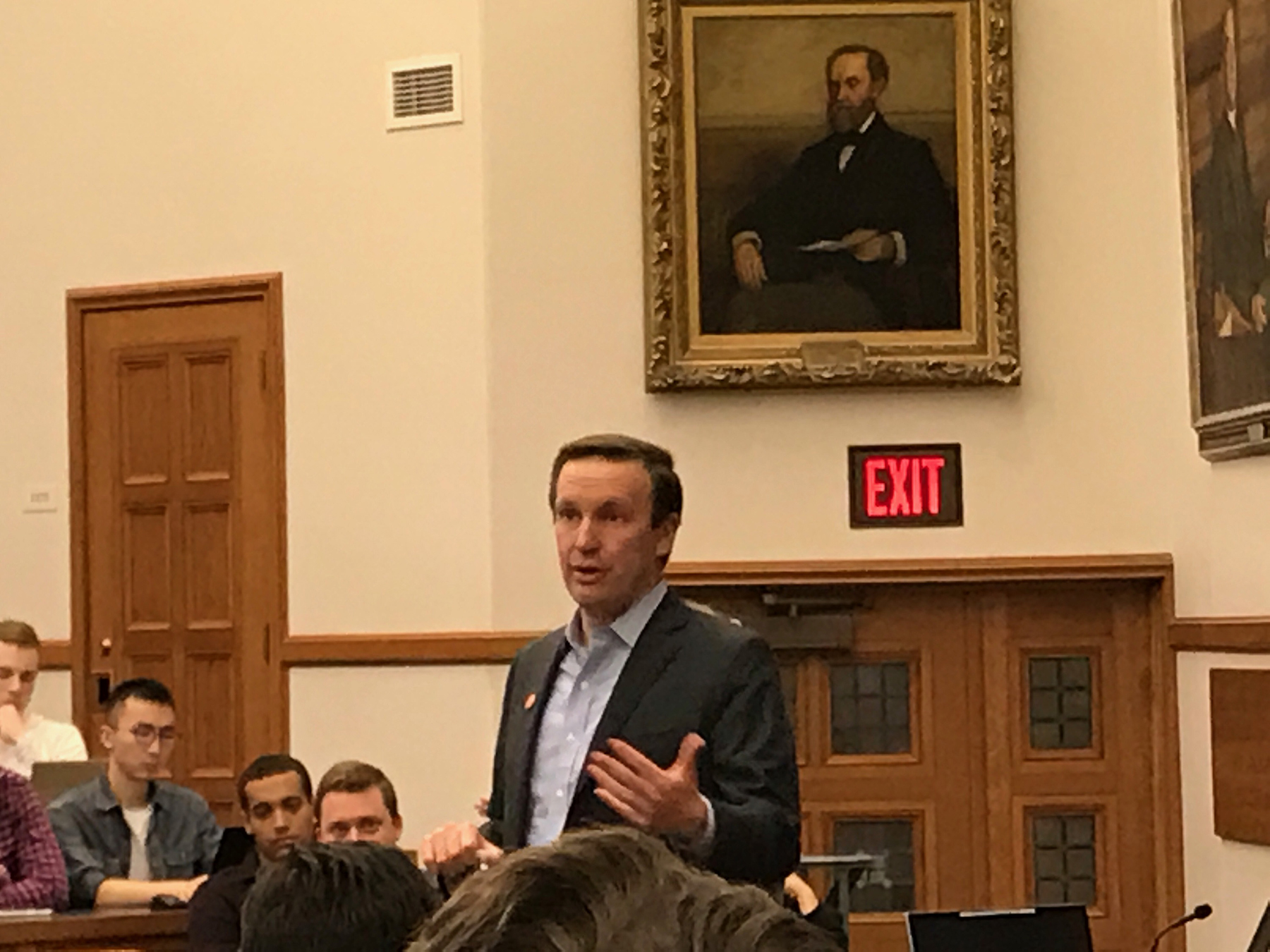
Sen. Chris Murphy, D-Conn., visited Yale Law School on Wednesday evening to speak with a crowd of over 100 about the importance of community activism and public service in the Trump era.
Murphy kicked off the event, which was cosponsored by the Yale College Democrats and Yale Law Democrats, with a brief address before opening the floor to questions. In his opening remarks, he emphasized the unique importance of the current political moment, saying that President Donald Trump’s executive orders and attacks on both the press and the judicial system present a threat not just to particular policies but to American democracy itself. Faced with this danger, Murphy said, citizens must engage wholeheartedly in politics.
“All that I want to communicate to you is that, whatever anxiety or fear or anger you feel about how the last 30 days have gone, there’s nothing of it that can’t be cured by political action,” he said. “This uprising that’s happening in Connecticut and across the country, it is already having an effect. I know it may not feel that way because it seems like there’s another gut punch every day … but I’m watching my colleagues react to this grassroots movement in a way that gives me hope.”
To Murphy, the evolution of congressional Republicans’ attitudes toward the Affordable Care Act illustrates the power of political action. Since the 115th Congress took office in early January, Republicans have shifted their line on the ACA from “repeal” to “repeal and replace” to “repair.” This progression, Murphy said, is the direct result of grassroots mobilization.
Beyond political activism, audience questions touched on a range of issues, including U.S. foreign policy, the Democratic Party’s economic messaging and whether Senate Democrats should oppose the confirmation of Neil Gorsuch, Trump’s nominee for the Supreme Court.
One audience member asked Murphy who he expected to emerge as the top Democratic presidential candidates for the 2020 election and whether he was considering making a bid of his own. The question was one of just a few that drew general applause from the audience. In reference to a recent New York Post report that the Trump administration has already begun looking into Murphy and three other top Democrats as potential challengers in 2020, Murphy said he found it “flattering” to be on the list but that he had was not considering a presidential run.
“I’m not thinking about running for president,” he said. “I’m thinking about running for re-election on the ballot here in Connecticut in 2018, and that’s my singular focus. I am interested, though, in being part of an emerging group of young Democratic leaders that I think has to step forward right now.”
Despite Murphy’s assurances that he will not throw his hat in the ring, some event attendees expressed their wish for the junior senator to run for president in the next election cycle. Nick Girard ’19 said he “absolutely” would like to see Murphy as a presidential candidate in 2020 and added that Murphy’s experience on the Senate foreign relations committee and his “new, fresh and bold” approach to governing would make him a formidable candidate.
Yale Law Democrats’ co-president Christina Ford LAW ’18 echoed Girard’s wish to see Murphy run for president in 2020 but said she would also be pleased to see other politicians, such as Sen. Cory Booker, D-N.J., and Sen. Kamala Harris, D-Calif., make a bid for the presidency.
Lauding Murphy as “the progressive voice of young people,” Ford said she appreciated the senator’s engagement and his candor in addressing political and social issues, all of which are close to the interests of undergraduates and law school students alike.
Ford further commended Murphy’s commitment to protecting Dreamers, or residents who immigrated illegally to the United States when they were children. This demographic was granted relief when former President Barack Obama implemented the Deferred Action for Childhood Arrivals program, allowing these minors to temporarily defer deportation and apply for work permits.
“I know that DACA is something that we’re really concerned about at the Law School, and we’re working to protect the Dreamers in this country, and so it was really great to hear that he feels a commitment and responsibility to protecting those kids,” Ford said.
Murphy’s opinion on the congressional debate surrounding the ACA also struck Ford as intriguing. She said the Republican Party’s attitude shift toward the ACA is a positive sign and indicates that mass political demonstrations are effective.
Constantin Cless GRD ’22 said he found Murphy’s discussion on foreign relations and the need for more foreign aid interesting. He added that Murphy was fair in saying that nonmilitary intervention is the way for the country to become the superpower that it strives to be. As a native of Germany, Cless explained that American investment in West Germany after the Second World War, among other efforts, led to a positive image of the United States abroad.
Alex Brod ’19, one of many students who asked questions during the talk, said he was pleased with Murphy’s response to his question on the relationship between popular support and electoral success. Underscoring the senator’s specificity in his answer, Brod said Murphy was unlike other senators who avoid specific details when speaking in public forums.
Murphy won election to the U.S. Senate in 2012.







